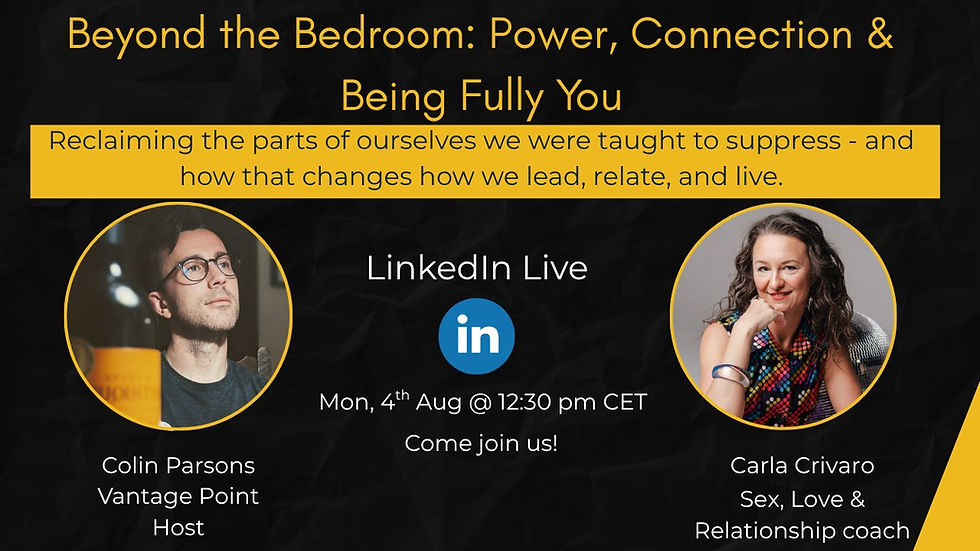Unclear Expectations? Expect Disappointment
- Carla Crivaro

- Mar 9, 2022
- 4 min read
Updated: Aug 10, 2022
Expectations. We all carry them in our relationships with others. They in fact are a reflection of our relationship with ourselves.
Most of us head into a relationship, unknowingly expecting that relationship is going to meet some need that wasn’t met in childhood. What that means is, quite often, we can unconsciously choose a partner because of how we feel when we are with them and how they behave with us, reminds our nervous system of how we felt when with our caregivers. Our caregivers being our very first experience of what love felt like.
So what happens is, that if as a child you frequently experienced a parent who would shut down out of disappointment, who wouldn’t talk to you about a problem, who would give you the silent treatment, as a child you possibly found yourself chasing that caregiver. Chasing them to know that they really did care. Wanting their attention, their validation for how you feel or even your very existence - you chase. The insecurity of their love, is what wires you for how love ‘should feel’, which can feel fleeting, unsafe, unpredictable and the need to prove oneself to win back the attention of the caregiver. You can feel abandoned. It can lead to an anxious attachment style which I also look at in From Anxious Attachment To Secure and Working Through Anxious Attachment Somatically.
What this can mean is, heading into a relationship as an adult you likely have the tendency to chase. You unconsciously find yourself in relationships where you self-abandon, people please, lack boundaries, always put other people’s needs before your own and are in constant fear of being abandoned. Your nervous system equates this feeling as ‘love’ as that is what you learnt growing up.
So how does this affect our expectations in relationships?
There are renowned relationship therapists such as Harville Hendrix and Helen LaKelly Hunt, who believe that part of the reason we end up in these relationships is not only because that’s how we experience love. That’s how our nervous system is wired to feel it. But also that in some unconscious way we want to change the pattern. That we want our partner to ‘change’ and suddenly be the one who meets our needs like our caregivers couldn’t.
Throwing into the mix the fact that we also bring into our lives what we unconsciously are used to, such as the in this case: the abandonment; the unpredictability; the feeling of being unsafe, etc. This behaviour our brains have taken to mean that ‘we aren’t good enough’, ‘that we aren’t deserving of love’, ‘that maybe we are too much’. It feels normal to be in this and we behave in a way that frequently puts us in this situation and in this story. We are ‘calling in’ the behaviour of a distant and unpredictable partner because of the unconscious story we attached ourselves to from our childhood about our position in relationships. We are reaffirming those stories, because it's what we know.
Let me give an example here. If you find that you are always in disagreement with your partner around them respecting your time, maybe they are booking things at a time that isn’t convenient for you, maybe you find that you feel your time is always being encroached upon and this seems to be a theme that runs through your relationship, I would invite you to take a look at your own behaviour. Are you being clear with your time? When you say ‘let’s do it Tuesday’ then they expect the morning you are free and plan their day accordingly and you aren’t free until the afternoon, how has your role or lack of clarification contributed to this misunderstanding? Maybe you find yourself frequently in situations of not wanting to commit to times or not dedicating your own time for yourself so you constantly feel that your time isn’t being respected. Clear communication around your expectations and clear boundaries will overcome these issues. Not looking at them with honesty and responsibility means that you will continue to invite the same behaviour over and over again - reaffirming your ‘wound’ that ‘no one considers me or my time’, ‘no one respects my time.’ This pattern of time and feeling that your life is encroached upon can come up for those who may identify more with an avoidant attachment style, which I explore further in Avoiding Intimacy? Avoidant Attachment.
What can happen when we aren't successfully communicating our expectations is that we can feel resentment. We don't feel understood. We don't feel respected. So if you take a look at where you hold resentment, then that is where your communication needs to improve!
The invitation is, when it comes to expectations, they need to be communicated. We cannot expect other people to ‘just know’ what our needs are. We need to take a look, understand where and how our needs could be better met and communicate them with our partner.
Where are we lacking in openly being honest and vulnerable? Where are we taking responsibility? Are we setting ourselves up for success or failure in our relationships? What about our partners? Are we setting them up for success or failure in their relationship with us?
It takes real self-responsibility. Accountability. And an uncomfortable exploration of where our patterns are and where we need to make the change.
Carla Crivaro is a trauma-informed and certified Sex, Love & Relationship Coach, she works with men and women internationally to reach their goals in delicious sex, profound love and authentic relationships. Carla helps men and women understand themselves and each other, sexually and relationally, in and out of the bedroom. You can reach her at hello@carlacrivaro.com.





Comments